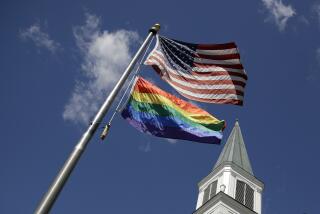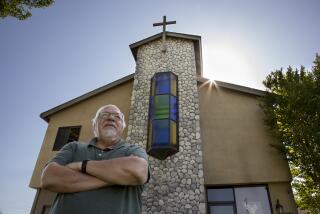United Methodist Church Ignores Regional Differences, Report Asserts
- Share via
The 9-million-member United Methodist Church, often considered the most broadly represented Protestant denomination in the nation, has been ignoring ominous regional differences in its ranks, according to a study by two professors at the Duke University Divinity School.
The 21-page study says it is really seven churches--with a booming Southwest region showing the only membership gain since 1970 and a large, cohesive church in the South holding even in Sunday attendance while membership continues to fall sharply in two Northeast sections and in the West.
Robert L. Wilson and William H. Willimon of Duke asserted that the second-largest U.S. Protestant body has concentrated on integrating women and ethnic minorities into church leadership structures to the neglect of regional representation.
Two-thirds of the 147 clergy serving in executive and professional staff positions on the denomination’s general boards and agencies come from states in the North and Midwest, they said. “However, over 40% of the funds to support the general agencies and the national programs of the United Methodist Church comes from the Church South and the Southwest Church,” they said.
They predicted that conflict in the church in coming years “may be more related to the clash of regional expectations and beliefs than to minority and feminist issues.”
Despite an overall membership decrease of 3.8% between 1970 and 1982, the Southern Methodists still have one-third of the total church membership. “The Southern church tends to be traditional in theology and style,” the authors said. “Many preachers still think people need to be converted.” Many congregations still have revivals, though less exuberant in style than those of a generation ago.
Never strong in New England, the mood of the United Methodist Church there was called “pessimistic” by Wilson and Willimon. It has few large and prominent churches in the region to give it visibility there, they said. The situation is not as bad in the industrial Northeast region, but the strongest individual churches are only located in small cities and towns outside the major metropolitan areas, they said.
“It seems clear that at least some Methodist leaders have not yet discovered that their church no longer has the impact on society that it once did,” they said.
Wilson said in a telephone interview that he and Willimon did the study out of their own interest in the problem. Wilson said he is “not a Southern conservative” but that he believes Methodist churches must put more emphasis on personal Christian commitment to the fundamentals of the faith in order to attract and keep new members.
The biggest percentage of net membership loss has occurred in eight Western states. That loss amounts to 23%, or a drop of 203 persons per week over a dozen years. Attendance at Sunday schools has also dropped 50% since 1970. Gallup polls have shown that church affiliation has remained lower in West than in the rest of the country while that region’s population has continued to grow.
The Western Methodist leadership is generally perceived as liberal, the authors said. But a strong element has been a more traditional theology in the membership.
To illustrate that statement, however, the authors apparently erroneously claimed that more United Methodists seminarians were enrolled in the relatively conservative, evangelical Fuller Theological Seminary in Pasadena than in the Methodist-related School of Theology at Claremont. A check with the two schools shows that there were 77 United Methodist students at Fuller out of a total enrollment of 1,500 students who identified their church affiliation and 161 United Methodists out of 375 students in Claremont.
One of the former Roman Catholic priests who attended a meeting last week in Ariccia, Italy, to push the idea of using married ex-priests in the church was Joe Bucco, who was given $3,000 to go by a “Christian base community” in a Catholic parish in San Diego County.
Bucco, coordinator of youth ministries for a parish in Vista, said he mentioned the gathering once and soon afterward in late July members of the small parish group presented himwith a check for the travel expenses.
A former Maryknoll priest, Bucco left the priesthood in 1968 to marry. His wife, Ann, is the nurse for the St. Francis Catholic School and a family life educator in the parish.
Not all men who left the priesthood in the post-Second Vatican Council period have expressed desire to return to the service of the church in liturgical and sacramental work. However, Bucco said that many who do have registered with an independent national organization called Corpus, which has argued that the growing priest shortages may force changes by the Vatican. Bucco said, for example, only two or three priests serve 3,000 to 3,500 families in the parish where he works.
Bucco said in a telephone interview after returning from Italy that he has decided to celebrate Mass in private settings when invited by small groups of Catholics, something he said occurs rather frequently in Spain and some other regions of the world.
“I used to do it perhaps once a year before, but I’m not going to be reluctant anymore,” he said. “The time for fear of censure is over, and it’s time to let the chips fall where they may.”
Buddhists and Muslims in America are not noted for their attention to public issues involving social change. But two conferences in the Los Angeles area, this weekend and next, will break that pattern.
“Spiritual Politics: A Conference on Social Change” will take place at the Whittier College School of Law today and Sunday. Contemporary issues such as genetic engineering, nuclear energy and the abortion debate will be discussed Sept. 14-15 during the third annual Islamic Information conference sponsored by the Islamic Center of Southern California. The conference, which has usually dealt with historical, religious and Middle Eastern topics, will be held at the Airport Marriott.
Ethnic religious communities have often considered current issues in America irrelevant to the struggles of these groups to survive. But Dr. Maher Hathout, a conference organizer, said, “Contemporary issues are also issues of survival. We either think about them or put ourselves into a museum of anthropology.”
More to Read
Sign up for Essential California
The most important California stories and recommendations in your inbox every morning.
You may occasionally receive promotional content from the Los Angeles Times.













